
Waste & recycling for businesses
Recycling information
The City is committed to reaching a target of 70 per cent diversion from landfill by 2025. To achieve this, we need your help in recycling correctly and thinking sustainably.
Depending on your business, or building, bins are offered in different sizes: 120L, 240L, 660L, 1100L.
The City is committed to diverting waste from landfill to meet state targets. We need your help to use your recycling bins efficiently and reduce the amount of waste we are sending to landfill.
We offer recycling education programs to businesses and can connect you with community groups to help reduce waste.
For further information of commercial services please email info.city@cityofperth.wa.gov.au or call the City on (08) 9461 3333.
Recycling services offered
- Commingled Recycling (yellow lid)
- Food Organics
- Garden Organics
- Paper and Cardboard
- Cardboard
- Containers for Change
- Glass
-
Collection schedule
Timetables for waste collection vary according to location. You can find your bin days by checking the sticker attached to your bins. This sticker will also tell you what time you need to have your bin out by, in order for it to be collected. If your sticker has faded, please contact the City on (08) 9461 3333.
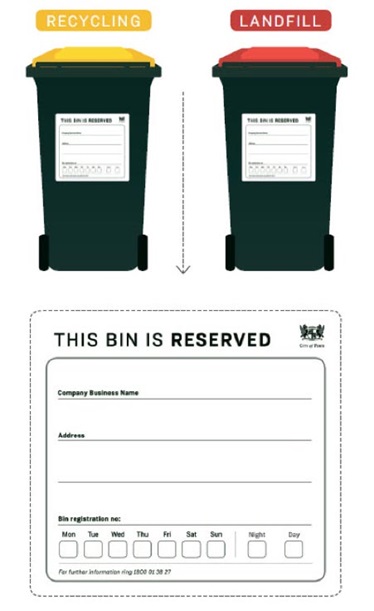
Putting your bins out
If your bin is serviced during the day, then your bin must be present at its service location by 6am.
If your bin is serviced at night then your bin must be present at its service location by 8pm.
The exception to this is for residents in West Perth, if your service is a night service, your bin must be present in its service location by 4pm.
Public holidays
All services on public holidays are unaffected, except for Good Friday (Easter) and Christmas Day. On these days, please still place your bins out at their usual service time and they will be collected by the next day.
Waste type Landfill Commingled recycling Garden Waste Food organic waste Glass Paper and cardboard Frequency Up to seven times per week Up to five times per week Fortnightly Up to three times per week Up to five times per week Up to five times per week -
Fees and charges
Businesses have the option to pay for additional waste and recycling services with the City of Perth. Additional bins can be hired on an annual basis and are serviced either weekly or fortnightly, depending on your selection.
LANDFILL (General) Waste Bins Description GST Annual Cost Basic 240L bin (Weekly) Exempt $431.60 Additional 240L bin (Weekly) Exempt $308.50 660L bin (Weekly) Exempt $893.25 1100L bin (Weekly) Exempt $1487.15
Glass Bins Description GST Annual Cost 240L bin (weekly) Exempt $735.30
Food Organic Recycling Bins Description GST Annual Cost 120L bin (weekly) Exempt $210.90
Yellow Commingled Recycling Bins Description GST Annual Cost 240L bin (Weekly) Exempt $183.65 660L bin (Weekly) Exempt $537.60 1100L bin (Weekly) Exempt $895.85
Green Waste Bins Description GST Annual Cost 240L bin (Fortnightly) Exempt $135.45 660L bin (Fortnightly) Exempt $203.20
Bin Hire Description GST Cost General 120L bin Inc $48.05 General 240L bin Inc $62.40 Cardboard only 660L bin Inc $315.45 Cardboard only 1100L bin Inc $393.35
Return for service/contamination fee Description GST Cost Return for service/contamination fee Inc $51.70
Description GST Cost -
Replacing or requesting extra bins
If your bin is missing or damaged you can request a replacement bin, or bin repairs. Replacements are made free of charge.
Missing bins
To obtain a replacement for a missing bin, please email info.city@cityofperth.wa.gov.au or call the City on (08) 9461 3333.
Additional or replacement bins
Additional bins or services can only be provided with the written consent from the property owner, strata manager or the managing agent. Written consent must include complete address details and a full description of the additional services required. All bins remain the property of the City of Perth.
If you need an additional, or replacement bin you can request a new bin online, email us or call us on (08) 9461 3333.
-
Commingled Recycling (yellow lid/green body bin)
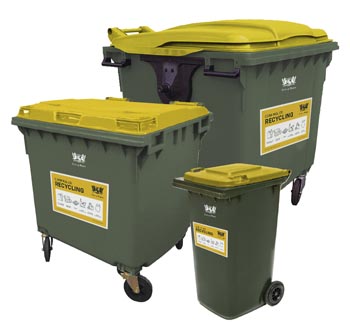
Businesses that request this service can recycle the following items in their yellow lid commingled recycling bin.
How to excel at recycling:
- Use two bins in your kitchen, one for recycling and one for landfill waste.
- Recycle all glass (including broken glass), cardboard, paper, metal and hard plastic (e.g. milk and water bottles). All other materials cannot be recycled in your yellow bin.
- Ensure all lids are removed from containers and bottles.
- Ensure all recycling is loose in your recycling bin and not in bags.
-
Garden Organics Recycling (lime-green lid/green body)
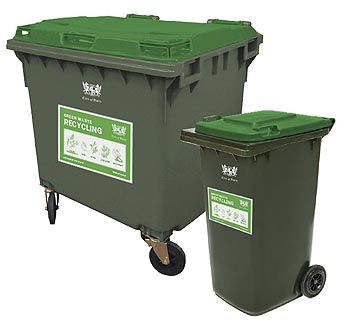
Businesses that request this service can recycle the following items in their garden waste recycling bin.
-
Paper and Cardboard Recycling (blue lid/blue body bin)
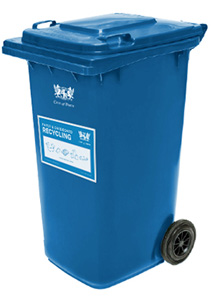
Blue paper and cardboard recycling bins are provided to some businesses to dispose of:
- Cardboard boxes
- Envelopes
- Milk (clean) cartons
- Paper and documents
- Newspapers and magazines
- Post-it notes
Businesses that request this service can recycle the following items in their paper recycling bin.
-
Cardboard Recycling (blue lid blue/body bin)
Blue Cardboard Only Recycling bins
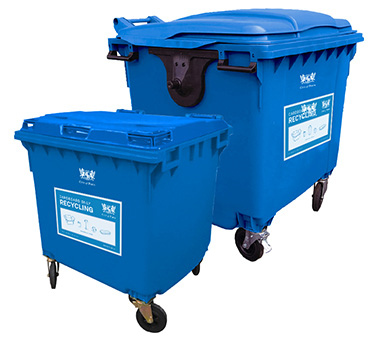
Businesses that request this service can recycle the following items in their cardboard recycling bin.
-
Glass Recycling (red lid/blue body bin)
Businesses that request this service can recycle the following items in their glass recycling bin.
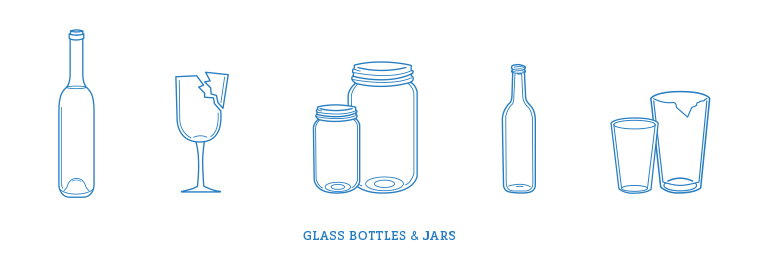
You can put broken glass in here, just handle carefully!
-
Garden Organics collection days
Garden waste recycling collection days


-
Food Organics Recycling (lime-green lid/green body)
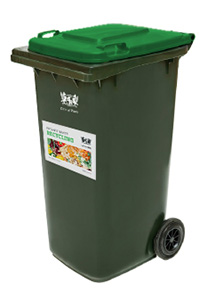
Businesses that request this service can recycle the following items in their food organic recycling bin.
To register your interest for a food organics bin service, please email info.city@cityofperth.wa.gov.au or call (08) 9461 3333.
-
Helpful Resources
Stickers, Posters and Signs
We have a new set of stickers, posters and signs to help people sort their waste correctly.
If you’d like some new stickers for your bins, or posters and signs for your bin area, email info.city@cityofperth.wa.gov.au or call 9461 3333.Languages other than English
We also have posters in 15 different languages to help people sort their waste correctly. Each pdf has 2 pages. Page 1 is for those with a Food Organics bin and page 2 is for those with only General Waste and Recycling bins.Languages other than English
Waste management and tips
Get to know what waste you're generating on a weekly basis and find tips to reduce, reuse and recycle.
-
Waste minimisation tips
Waste tips
- Know what your waste is by looking is your bins. Establish and record the types and quantities of waste your business produces.
- Separate the different types of waste. What items can be recycled or reused? Make sure you have the right amount of different bin types for waste going to landfill and for recycling.
- Introduce a waste reduction program. Build cooperation and communication amongst your staff. Appoint a waste management coordinator who can identify local recyclers and establish a program that reflects your business’s needs. This could even develop into a sustainability or green team that tackle water and energy next.
- Review your products. There are many instances where businesses can decrease supply and disposal costs. Does the cost of disposing or materials outweigh the cost of producing or buying them? Could your business use fewer materials in packaging, or better still, reuse or recycle them?
- Buy green goods. Talk to your suppliers about using environmentally friendly products or materials. Buying recyclable or eco-friendly products are often the same price but better for the environment and easier to dispose of.
Utilise the Planet Ark War on Waste Toolkit for Business. Every small step you take is meaningful as we all work together to tackle the waste epidemic.
Refuse
- Reduce coffee cup waste with Responsible Cafes. The City is currently running a campaign in association with Switch your thinking and Responsible Cafes. Australians throw away over one billion takeaway coffee cups every year. We’re changing that by calling on local cafes to offer a discount to customers who order their takeaway coffee in a reusable cup. Registered cafés pledge to offer a small discount (usually 20-50 cents) for takeaway coffee served in a reusable cup. All cafes have to do is register with Responsible Cafes and start promoting your discount.
- Choose reusable whenever possible. Think BYO cups, bottles, cutlery and picnic plates, reusable shopping bags, rechargeable batteries, even reusable straws! Explain and market to your customers that these efforts are for the environment and assist them in overcoming barriers.
- Say no to the big 4 — plastic water bottles, straws, coffee cups and plastic bags. Go reusable. For food and beverage businesses, keep your straws behind the counter and only offer straws if your customers ask.
- Think twice before printing. Go for recycled paper when you must have a hard copy, and reuse those scraps in a handmade notepad.
- Say no to junk mail! How can you avoid printed marketing materials and more effectively reach your potential customers?
- Switch to paperless billing wherever possible.
- Ensure your organisation has a policy to prioritise electronic documents as much as possible. In offices, all documents can be easily shared via email. Hard copies can often get left to collect dust on a shelf!
- Refuse single-use plastic and encourage your customers to bring their own take-away containers to restaurants.
Reduce
- Reduce the amount of chemicals and plastic waste in your business where possible by using environmental friendly cleaners.
- Speak to and challenge your suppliers on how to cut down unnecessary packaging.
- Food businesses can make their own soup, yogurt, bread and salad dressing to cut down on plastic waste.
- Food businesses can cut down food waste by effectively planning each day/week. Get more for your money, and use what you buy. Regularly review unused fresh food and find recipes to use up all your leftover food. Offer specials and alter stock levels and menus to ensure all food is utilised.
- Reduce the amount you need to buy by choosing durable, high quality goods.
- Ditch the water bottles in favour of filters and glasses.
- Limit paper use by defaulting printers to double-sided printing, and limiting the number of computers with printer access.
- Only offer bags or packaging to customers when they ask for it.
Reuse
- For all leftover edible food from catering or cafes, the City recommends donating the food to a food rescue organisation. Instead of this food ending up in the bin, businesses could connect with community groups to reduce waste sent to landfill, ensuring items can be redistributed to people in need where possible. There are three organisations that businesses could connect with in Perth to ‘rescue’ their food waste including Food Rescue, Oz Harvest and Foodbank.
- Speak to and challenge your suppliers on how to cut down unnecessary packaging. Often reusable alternatives be used and can be collected by the supplier after each delivery.
- Help your building and other surrounding businesses. Talk with neighbours about your sustainable business practices and share ideas / success stories.
- Choose reusable cutlery and tableware, refillable condiment dispensers, and reusable food containers where possible.
- Buy it back. Unless you’re buying products made from recycled materials, you’re not fully recycling! Printed paper, toilet paper and tissues are a great place to start.
- Make do and mend. Before replacing broken items have a go at upcycling to get new life out of stuff you already have. Can you utilise old jars, wine bottles etc for serving?
- Rehome and Recycle everything you can. Take good quality unwanted items to a local op-shop.
- Consider refillable containers for bathroom amenities, and reusable cutlery, tableware, and condiment dispensers, in restaurants.
- If your workplace printer uses refillable cartridges, hold a toner-refill-demonstration morning tea to encourage reuse.
- Repurpose. Before throwing it away, think of how it can be used in a different way. Old clothes and linen make great dusting rags, chipped coffee cups make great indoor plant pots and an old suitcase can even be repurposed as a dog bed.
- For working electronics, place them on Gumtree for free. Computers can be donated to local community groups such as Lions Club. Computers and other electronics can also be recycled at certain facilities such as Total Green Recycling and Sims.
Recycle
- If you have a coffee pod machine ensure that you implement a recycling box to ensure all materials are recycled. Large buildings such as offices that use Nespresso machines can have their own recycling box which is collected for free. There are more tips and details on the Nespresso website.
- Make sure your business has clearly labelled waste and recycling bins that are equally accessible, placed in pairs, all around the building/kitchen etc. If recycling or waste bins are placed on their own they are more likely to be contaminated. Set staff up for success!
- Printer cartridges can’t go into your recycling bins. However, printer cartridges can be recycled at a range of retail stores under the Cartridges for Planet Ark recycling program. Planet Ark offers two useful services – return your cartridges and register for a collection box.
- Gas cylinders and butane canisters can’t go into your recycling bins. They are hazardous to the sorting equipment and the hard-working staff at the recycling facilities. Please take all your hazardous goods including gas cylinders and butane canisters to your local transfer station for proper disposal. Please contact your closest drop off point for more information:
- Shenton Park (West Metro Recycling Centre) – 9384 6711
- Tamala Park (Mindarie Regional Council) – 9306 6303
- South Perth – 9367 2492
- Recycling Centre Balcatta – 9205 8555
- Anything with a power cord cannot go in your normal bins. Ensure all your colleagues know where to place all broken electrical items. Then take all your hazardous goods including ewaste to your local transfer station for proper disposal. See Drop Off Facilities for more information. If electrical items still work, check the reuse section for different options.
- Cardboard should be flattened before it goes into your recycling bin. This ensures it can be easily sorted in the recycling facility. Please help the sorting staff at recycling facilities by flattening all your cardboard (big and small) before it goes into your recycling bin.
- All containers must be empty and reasonably clean before going into your recycling. The easiest way to clean dirty containers (like yoghurt) is to use the dirty dishwater once you have finished washing your dishes. Saving water and recycling right!
- Recycle. Use your yellow top bin for all your recyclables and remember not to put them in plastic bags which can jam recycling machines.
- Compost food scraps. Bokashi buckets and worm farms work well for small urban spaces, and every 1kg of food ‘recycled’ saves 1kg of greenhouse gas emissions. You can find some quality factsheets on the Mindarie Council Website, and Recycling Near You. The City can also provide you with a green organic waste bin for a small fee.
More resources
Other ways we help
-
Event waste and recycling
The City delivers 120L, 240L, 660L or 1100L bins direct to the event location, based on expected volumes and event requirements. They are serviced as required (once or multiple days), then collected as per the agreed schedule and accepted quote. As the City has waste vehicles servicing the City 7 days a week, additional services can be added as required. Fees can be added to event applications or invoiced separately based upon what is most convenient.
The City encourages event organisers to reduce the amount of waste generated by the event, and maximise recycling to minimise waste taken to landfill. Sustainable and innovative waste management techniques can result in improved cost efficiency by reducing post-event clean-up costs and the cost of disposing of waste in landfill. Providing recycling bins and reducing litter can enhance the reputation of the event, making it more attractive to tourists and other visitors.
The City can also assist in recycling education and ensure that events develop and improve their waste management systems. We help connect event organisers with community groups to reduce waste sent to landfill, ensuring items are reused and recycled where possible.Event waste and recycling fees
Please see the event waste and recycling fees below. (prices are excluding GST)
Event Bin Hire & Cleaning Description GST Cost 120L / 240L bin hire (per week) Excl $1.25 Bin cleaning (per bin) Excl $2.40 Event Bin Delivery Description GST Cost Less than 5 bins (240L) Excl $103.30 5 to 10 bins (240L) Excl $138.20 Up to 20 bins (240L) Excl $206.65 Landfill (GENERAL) WASTE Bins - COST PER COLLECTION Description GST Cost 240L bins Excl $7.70 660L bins Excl $19.25 1100L bins Excl $29.55 Recycling (COMMINGLED) Bins - COST PER COLLECTION Description GST Cost 240L bins Excl $6.05 660L bins Excl $14.40 1100L bins Excl $22.85 FOOD WASTE ORGANIC BINS - COST PER COLLECTION Description GST Cost 120L bins Excl $6.05 Admin Fees Description GST Cost Admin Fee (Monthly Billing) Excl $149.10 Ad hoc fee Excl $60.10 -
Street cleaning
The City operates an intensive nightly street cleaning operation from Victoria Avenue to Milligan Street, east to west and from St Georges Terrace to Aberdeen Street, south to north.
Daytime street cleaning in the central city is carried out using small mobile mechanical cleaners. Areas outside the central city are cleaned using ride on mechanical cleaners. The City has a high-pressure cleaning process which incorporates a fine water spray. This enables stains and spillages to be removed. -
Noise Management Plan (NMP)
The City of Perth engaged Lloyd George Acoustics in 2017 to prepare a Noise Management Plan (NMP) for the City's Waste and Cleansing Unit, to minimise the noise impact for waste collections and street cleaning to sensitive receivers from out-of-hours essential services carried out by the City of Perth within its boundaries.
This will allow the City to conduct essential services more efficiently, including:
- Cleaning the streets after events and weekend nightlife activities in the CBD and Northbridge, to ensure that the City is ready for breakfast trade the next morning.
- Collecting waste and recycling outside of peak vehicle times, decreasing traffic congestion, and increasing staff and public safety.







